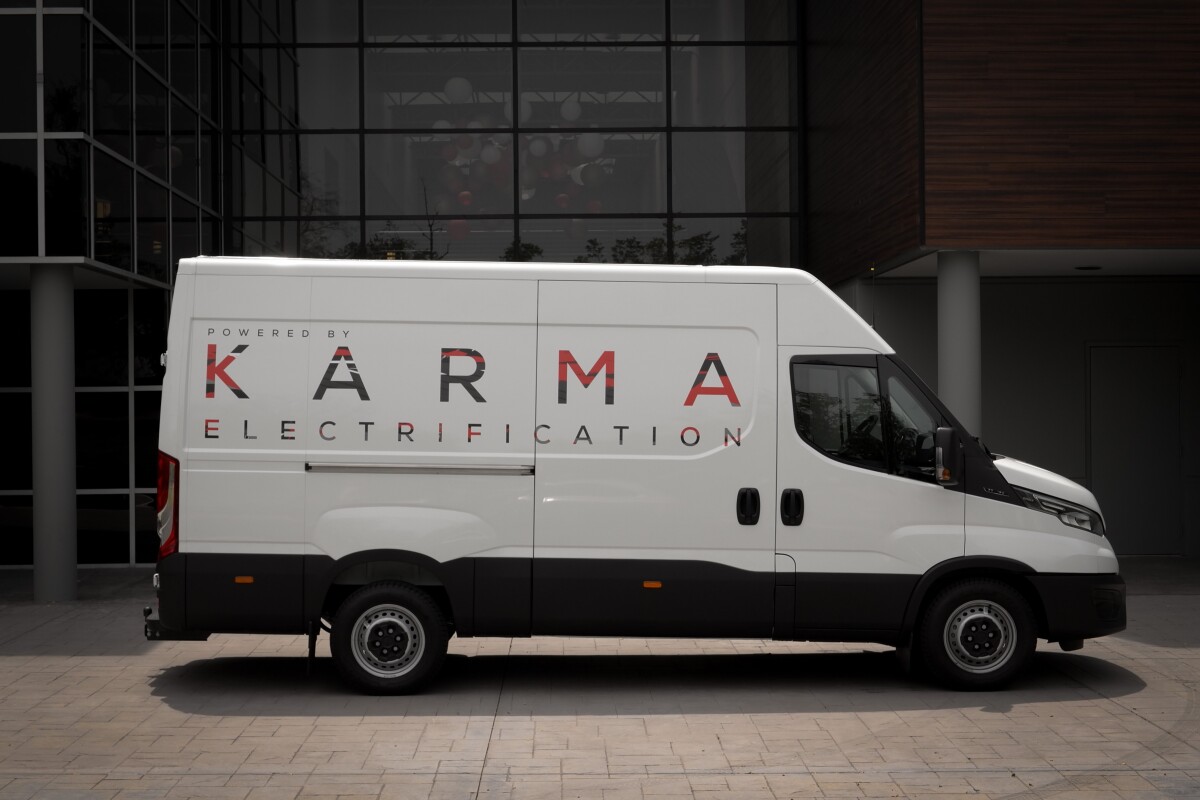Why jump straight to low-range electric motorhomes when plug-in hybrids offer practical performance in the present? It's a question we've pondered when looking at 300-km (186-mile) electric Class C motorhomes or 200-km (124-mile) electric mini-campervans. Fully electric vans are getting there, but plug-in hybrid vans are there now, offering over 500 kilometers (300 miles) of range and the ability to refuel at a gas station. Now Karma previews a larger, roomier, cleaner breed of PHEV van and camper van with the new EREV E-Flex platform.
If you're feeling déjà vu, it's because we've seen a Karma electrified van before ... just a few weeks ago. While many larger automakers have been laying low with little to no news during the COVID-19 shutdowns, Karma has taken advantage of the scaled-back news cycle with weekly previews of its planned electric platforms. Three weeks ago, it showed the L4 E-Flex van, putting the focus on next-gen autonomous systems and battery electric drive tech. This week, it's the Extended Range Electric Vehicle (EREV) E-Flex utility van platform.
Karma doesn't lay out the hard specs of the EREV hardware, but it estimates an all-electric range of 200 miles (322 km) and a total gas + electric range of 400 miles (644 km). Range figures would vary by configuration and usage, and Karma mentions camper vans alongside various other potential commercial vehicle and shuttle use cases. The single photo accompanying its announcement teases the platform below a large high-roof van body that would offer more space for a full camper floor plan than the smaller Ford Transit Custom that underpins a couple recently debuted PHEV camper vans. It looks like you could even fit a bathroom in the Karma.
The 200-mile electric range would be enough for work and leisure vans to make many zero-emissions trips using only electric power, while the range-extender system would make for seamless extended trips and holidays.
Karma did not release a range estimate on its all-electric E-Flex van platform with which to compare, but it has this month thrown around the idea of a 400-mile range for the all-electric Revero GTE sedan and High-Performance E-Flex hypercar. Even if a heavier, boxier e-van were able to achieve that same 400 miles, and even if the heavier, furniture-loaded camper version didn't lose that much mileage, the EREV camper would offer one critical advantage: the ability to fill the tank on the move, in a few minutes' time, at a run-of-the-mill gas station. That's something that can be the lifeblood of a successful road trip, ensuring peace of mind, flexibility and spontaneity, no need to map charging station to charging station or stop for extended plug-ins.

In addition to being sold as a rolling chassis, Karma says the EREV van could be sold as retrofit components, so a manufacturer could use it to electrify an existing van model. The platform is still under development with no announced launch date.
We always take platform previews and their accompanying number estimates quite skeptically — 200/400 miles of electrified van range looks nice on paper but is a far cry from achieving it on pavement — but this one comes with an extra serving of skepticism. A recent Jalopnik article linked to an anonymous source previously with Karma suggests that Karma's recent media campaign may be little more than over-promised vaporware meant to attract financial investment ahead of mass layoffs coming in May. Whether or not that report proves wholly or partially true, it shows that skepticism is quite healthy when looking at next-gen electric vehicle hardware —Karma's announcements are best looked at as "what could be" rather than "what will be."
For now, the plug-in hybrid camper market will continue to be driven by European mini-campervans based on the Ford Transit Custom PHEV, with the occasional Chrysler Pacifica PHEV minivan-camper sprinkled in. Whether or not a larger plug-in hybrid camper van joins them, and whether or not it uses Karma tech remain questions.
Source: Karma Automotive





